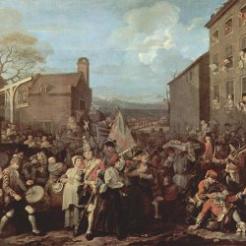The Charity Commission has met with the dismissed trustees of the Foundling Museum, and the trustees of the Musuem's founder the Thomas Coram Foundation, to discuss “current difficulties”, believed to be a row over the alleged “hostile takeover” by Coram of the Foundling Museum.
In June, The Guardian revealed that the Attorney General had written to children’s charity Coram after it sacked the Foundling Museum’s six trustees.
Trustee and Turner Prize winner Jeremy Deller told The Guardian at the time that his dismissal felt like a “hostile takeover of a well-run organisation”.
The Foundling Museum holds a celebrated body of art which was assembled by the trustees of Coram Hospital, set up in the 18th century by City merchant, Thomas Coram, to raise and educate homeless children.
The Coram Hospital became the Coram charity, which set up the Foundling Museum in 2001 to protect the artworks collected throughout its history.
The imaginative solution, brokered then by the Attorney General, was for the Foundling Museum to raise money to buy the art from Coram, and house it. It has now bought much of the Coram collection, including paying £4m for Hogarth’s 'The March of the Guards to Finchley'.
Coram describes the Foundling Museum as being one of several linked charities in the Coram group. It is its sole member, akin to sole shareholder.
In June, the Attorney General wrote to the trustees of Coram, concerning the sacking of the Foundling Museum’s six trustees. The Guardian reported that, last year, without the knowledge of the Foundling’s board or the Attorney General, Coram changed the Museum’s articles and memoranda, allowing it to sack Foundling trustees. It also consolidated the Foundling’s accounts into its own.
Many high-profile figures in the art world slammed Coram’s actions. Sir Nicholas Serota, director of the Tate, told The Guardian the sackings were “incomprehensible” and said he was worried about the future of the museum, while Stephen Deuchar, chief executive of the Art Fund, said he was “deeply concerned”.
The Attorney General has passed the matter to the Charity Commission, which has now met with the trustees of Coram and the dismissed trustees of the Foundling Museum.
A spokeswoman said: “The Commission is aware of current difficulties which exist between the Thomas Coram Foundation and the Foundling Museum and we are keen to see these resolved in the best interests of both charities. We have met with the representatives of the Foundation and with the dismissed trustees to enable us to understand these difficulties better and have been assessing a number of key issues which deal with the relationship between the Foundation and the Museum.
"We are treating this as a matter of priority and will shortly be writing to those involved setting out our provisional views on these issues in the hope that this clarity will enable a satisfactory way forward to be found.”
A spokeswoman for Coram said: “The Museum is one of several charities in the Coram group, working together to achieve common aims. Some former Museum Trustees felt things should be done differently and their opinions were, in view of professional advice to the Coram board, considered incompatible with the charity’s Charter. The Charity Commission is aware of this background.
"The Coram collection of historic works of art will be maintained and protected and is on display at the Foundling Museum to be enjoyed by all. Both organisations look forward to continuing their linked purposes to advance Coram’s work for children today.”









